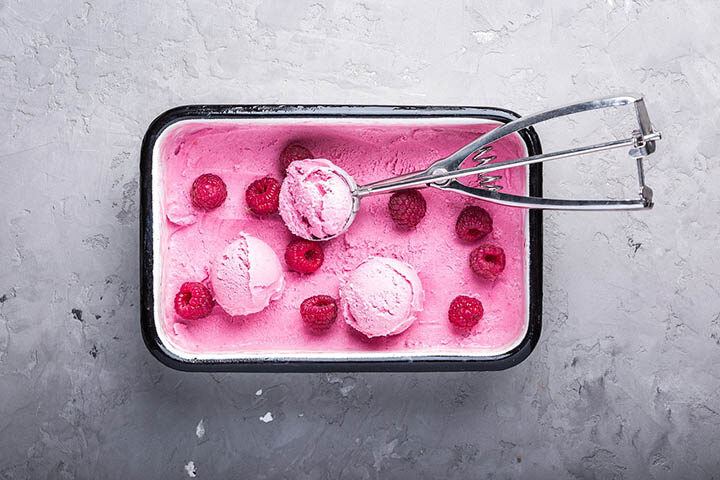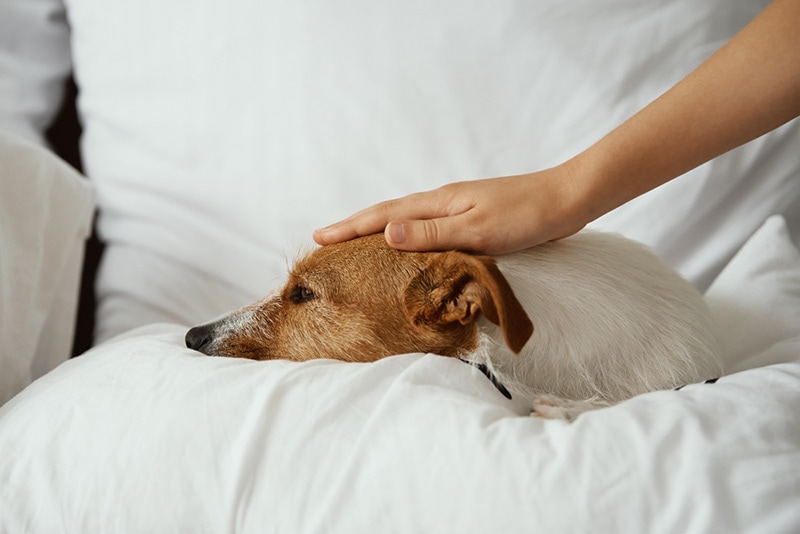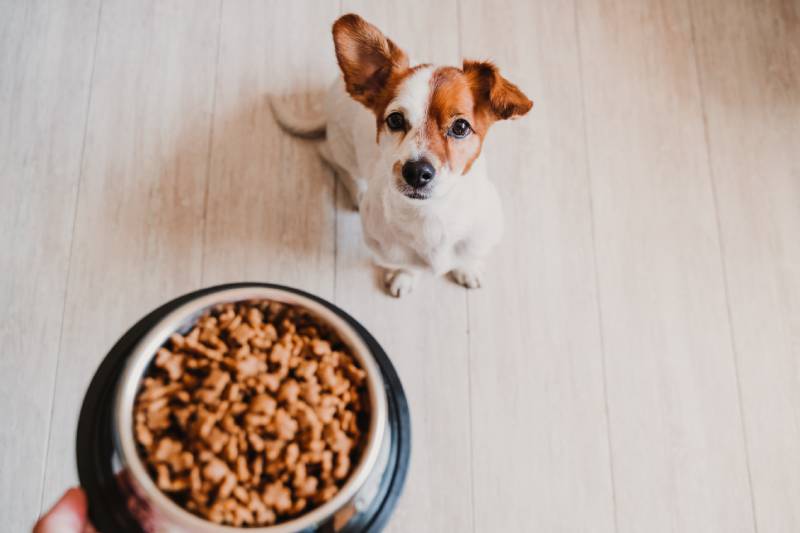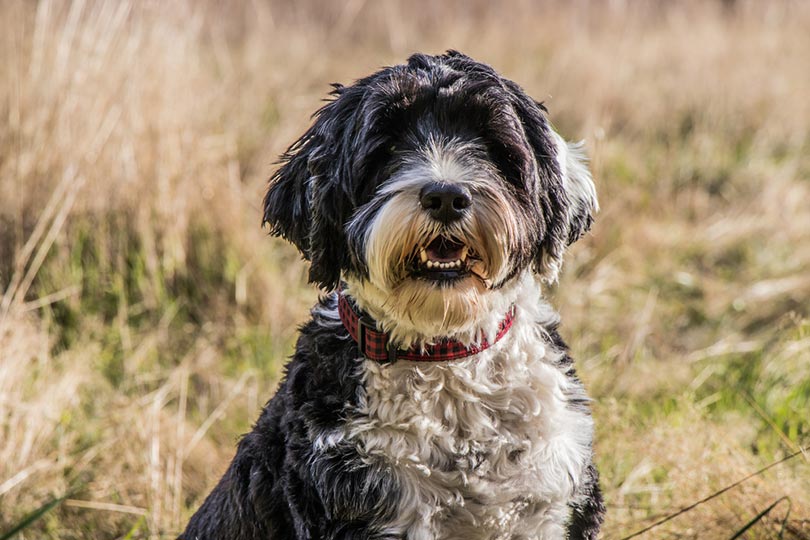Can Dogs Eat Sherbet? Vet-Reviewed Health Facts
Updated on

Click to Skip Ahead
Sherbet is a delicious, frozen treat that many enjoy, but is this healthier alternative to ice cream something that dogs can eat, too? Knowing what foods are safe for your dogs to eat is important to ensure their health and safety. To be quite frank, dogs should not be allowed to snack on any human foods, including sherbet.
Sherbet is not toxic to dogs, but it is unhealthy and not something that should be part of their diet. If your dog were to get into your sherbet, there’s typically no need to worry. Keep reading to learn more about why this dessert isn’t ideal for dogs and some healthy alternatives you can offer instead.
What Is Sherbet, Exactly?
Sherbet is a frozen dessert that is very similar to sorbet but much creamier. Sherbet is made with fruit, sugar, and dairy products such as cream, milk, egg whites, gelatin, or even buttermilk to make a more creamy, rich dessert than your typical sorbet.
Sherbet is still a healthier alternative to ice cream since it is derived from real fruit and typically contains less than 2% fat, but it still has plenty of sugar. This is speaking in terms of a human diet though, as neither sherbet nor ice cream has any place in a dog’s diet because it contains sugar and dairy products.

Lactose Intolerance in Dogs
Dairy products are a leading source of food intolerance in dogs. Many canines are lactose intolerant, which means they are either partially or completely unable to digest lactose.
Lactose intolerance occurs when the small intestine does not produce enough of an enzyme called lactase to properly digest lactose, which is milk sugar. Lactose is found naturally in the milk of mammals and while nursing puppies will produce plenty of lactase to help them break down their mother’s milk, this overproduction will cease and sometimes stop altogether after they’ve been weaned.
Some lactose-intolerant dogs may experience issues with drinking milk but won’t have any problem with plain yogurt, cheeses, or butter which are typically easier to digest. Others may have adverse reactions to any type of dairy they consume. Since sherbet is made specifically with dairy products, it’s best to avoid feeding your dog.
Telltale Signs of Lactose Intolerance in Dogs
Since dogs can have varying levels of lactose intolerance; signs may vary by individual and can range from mild to severe. Some dogs may show no signs of gastrointestinal disturbances after consuming dairy products while others may show exhibit the following signs:
- Loose stools
- Diarrhea
- Gas
- Bloating
- Vomiting
- Abdominal pain

The Importance of Avoiding “People Food”
Feeding the occasional human food to your dog may not be the worst thing you can do and while it may seem harmless to some, it is never a good idea to feed a dog table scraps or other human foods for a variety of reasons.
1. Begging Behavior
Feeding your dog table scraps and a variety of human foods can very easily lead to begging behavior. This can be very frustrating, inconvenient, and difficult to remedy. The last thing you want is to have your dog staring at people’s faces, whining, or exhibiting other attention-seeking behaviors so they can share a meal.
Feeding your dog when they are behaving like this will only reinforce the behavior and make the problem worse. Breaking the habit will require a lot of training, time, and patience, which is why it is highly recommended to avoid this altogether.
2. Digestive Issues
Human food can easily lead to various digestive issues for dogs. Their digestive systems are different from that of a human being, and dogs are not equipped to eat a human diet. Many human foods are also full of sugar, carbohydrates, and fat, which is incredibly unhealthy for your dog to eat.

3. You May Create a Picky Eater
Constantly offering tasty foods to your dog could cause them to turn their nose up to their dog food and only expect to be fed human food. Certain dogs may refuse to eat and may cause alarm to their owners because of what seems to be a lack of appetite.
If a dog is refusing to eat, a veterinary exam to rule out any underlying health conditions is needed but may ultimately be related to the fact that they no longer want dog food because they have been spoiled by various table scraps.
4. Risk of Toxicity
It’s also important to note that if your dog is allowed to eat human foods, it increases the likelihood that they eat something that is toxic, which can be very dangerous and potentially result in a medical emergency.
Some dogs are very picky about what they eat, while others are living garbage disposals. Whether they steal something off the counter or the table or a person in the home isn’t knowledgeable about what food is unsafe for dogs, this is a risk you don’t want to take.

The 5 Tips for Feeding a Healthy Diet to Your Dog
Aside from avoiding human food as much as possible, there are plenty of other ways you can ensure your dog is being fed the healthiest diet possible. Here are some additional tips to keep in mind for making the best nutritional choices for your best friend.
1. Research Dog Food and Dog Treat Brands
It’s a good idea to do your research on the different brands on the market offering dog food and/or dog treats. Read reviews from other dog owners, look into the brand’s reputation, check for recall history, and look to see if they include the AAFCO nutrient profiles for pet foods.
Feeding a high-quality diet is very important for dogs, just like it is for humans and all other animals. Nutrition plays such a vital role in overall health and wellness that you do not want to settle for a brand that does not put this at the forefront of their business.
2. Learn How to Read Labels
Learning how to read the dog food label is incredibly useful. Look over the full list of ingredients, the caloric content, and guaranteed analysis to see how the food stands up to competitors. The label can teach you a lot about the food or treats you are feeding your dog.

3. Avoid Unnecessary Ingredients
The world of dog nutrition can be complex to understand. There is also a lot of controversy surrounding certain ingredients and formulations. It is often recommended to avoid certain ingredients for the sake of your dog’s health. Artificial preservatives, flavors, and dyes are often things that owners wish to avoid. There are also plenty of fillers, especially in dry kibbles that are often frowned upon. It’s a good idea to talk to your veterinarian about ingredients that are best avoided or if you have any other questions about your dog’s diet.
4. Consider Your Dog’s Specific Needs
Dogs should be fed a diet that is high-quality and appropriate for their size, age, and activity level. All of these factors can determine what kind of nutritional requirements your dog needs for a well-balanced diet. Special diets or supplementation may be required if dogs suffer from specific health conditions or have any other nutritional needs. Both specialized diets and supplements should only be offered if advised by your veterinarian.
5. Talk to Your Veterinarian
We cannot stress enough the importance of talking to your vet if you ever have questions about your dog’s dietary and nutritional needs. You should never make any changes or add anything to your dog’s diet unless you first discuss it with your veterinarian. They are the ones that know and understand your dog’s medical history and specific needs.

Conclusion
While eating sherbet should not cause your dog any problems outside of potential digestive disturbances, this dessert should not be something you offer as a treat or include in your dog’s regular diet. Sherbet contains dairy products, and most dogs suffer from lactose intolerance. It is also full of sugar, which is not something your dog needs. Feeding your dog any human food is highly discouraged for many reasons, so it’s a good idea to stick to high-quality dog food and dog treats.
See Also:
- Can Dogs Eat Chocolate Ice Cream? Vet Approved Facts & FAQ
- Can Dogs Eat Ice Cream Cones? Vet-Reviewed Risks & Alternatives
Featured Image Credit: Seksak Kerdkanno, Pixabay













